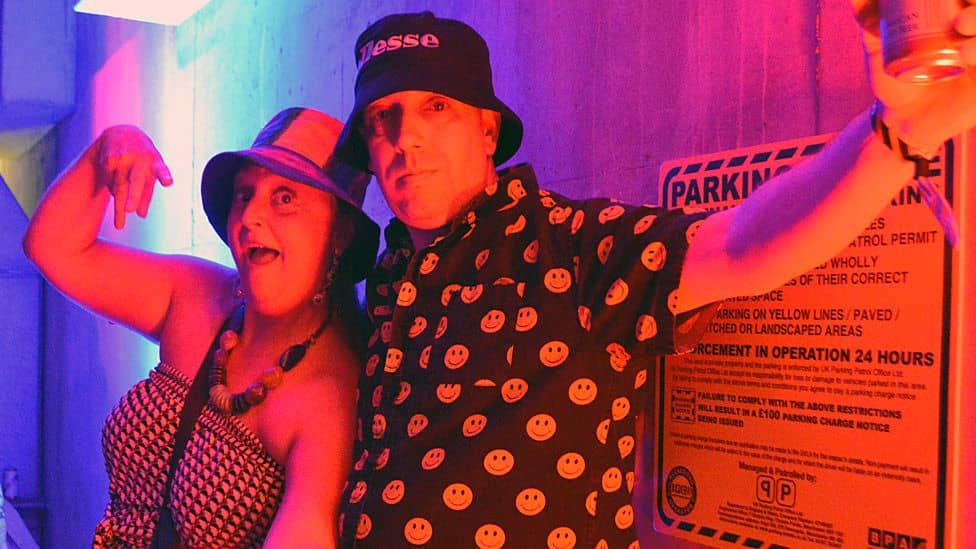The Hacienda rises again: The Manchester nightclub raves on after 40 years
23 May, 2022

Hundreds of middle-aged ravers attempted to recapture the glory days of the Hacienda at a 40th anniversary party on Saturday - in the car park of the flats that now stand on the site. The nightclub's legend is as strong as ever, and its impact is still felt in Manchester.
Every weekend in the early 1990s, Ann Cooper would drive from Yorkshire to Manchester with her husband. They would park their van outside the Hacienda, go inside, then go back to the van to sleep.
"We couldn't afford to stay in a hotel," she recalls. "So I used to come every single week and sleep in a van."
On Saturday, Ms Cooper returned for the club's 40th birthday - although this time not staying in a van. "The best times of my life were here, without a shadow of a doubt," she says. "It was the music, the atmosphere... it was just the place to be." The venue opened in 1982, and within five years had became the spiritual home of the acid house movement and the ecstasy-fuelled epicentre of British youth culture. Jane Ellis used to travel from London every weekend. "It was legendary all over the country. There was no place like it," she says.
"That's why you try to relive it, because you'll never get those times back again. And regardless of how old you are, those memories will never, ever fade."
Around 1,000 clubbers relived the Hacienda's halcyon days on Saturday, with old-school ravers joined by younger clubbers who were not alive when it shut in 1997.
It couldn't be exactly like old times, though. The former yacht warehouse that housed the Hacienda was demolished in 2002, and the Hacienda Apartments built in its place.
So Saturday's event was staged in the block's underground car park, with its concrete pillars painted in the club's trademark yellow and black diagonal stripes.
Who knows what Hacienda and Factory Records co-founder Tony Wilson would have made of it. Wilson, who died in 2007, opened the venue with the band New Order as a "cathedral" for Manchester's youth.
After it shut, he declared that "nostalgia is a disease" and argued that erecting flats in the city centre was more important than preserving the original building.
If nostalgia is a disease, it's one people don't mind catching.
When a 24-hour Hacienda-branded virtual party was held on New Year's Eve, it attracted four million viewers, organisers said. Saturday's rave was also streamed online and raised funds for The Christie cancer centre and the Legacy of War Foundation's work in Ukraine.
A BBC documentary is being made about the Hacienda, artefacts from the club feature in the new British Pop Archive exhibition, and a book about the venue's fashions is coming out.
Meanwhile, Hacienda Classical events have been held everywhere from the Royal Albert Hall to the Glastonbury Festival.
And on Friday, Manchester's hottest current rapper, 22-year-old Aitch, released a new single harking back to the Madchester heyday, on which he raps that he wants to "rave like it's '89".
The original club was not an immediate success. Julie Bancroft worked on its reception on the opening night.
"I had to stand and hand out roses to all the women who came in," she says. "To be honest, it was dead quiet."
What does she remember about that night? "Bernard Manning." The politically incorrect comedian was on the bill on the first night, alongside New York funk rock band ESG.
Things did improve. "I used to do all the memberships downstairs. They were queuing for miles to get a membership," Ms Bancroft recalls, speaking in the car park on Saturday.
"I just had the best time in my life. It means a lot. I spent a lot of my life here with all these people."
The club went through three phases, according to journalist and author Andy Spinoza, who was Hacienda member number 9262.
"There was the indie-rock phase, where it was very poorly attended generally. It lost a lot of money and it seemed to be too big for the audience," he says.
"It was only when rave music took over that, suddenly, the club appeared to be built for an audience that didn't even exist 10 years earlier. It was cathedral-like. It was a transcendental experience - obviously enhanced by mood-altering drugs."
He recalls a line that was often quoted at the time to describe the euphoric atmosphere - that it was like "when a goal is scored at a football match - for six hours".
Source: www.bbc.com
TAG(s):
